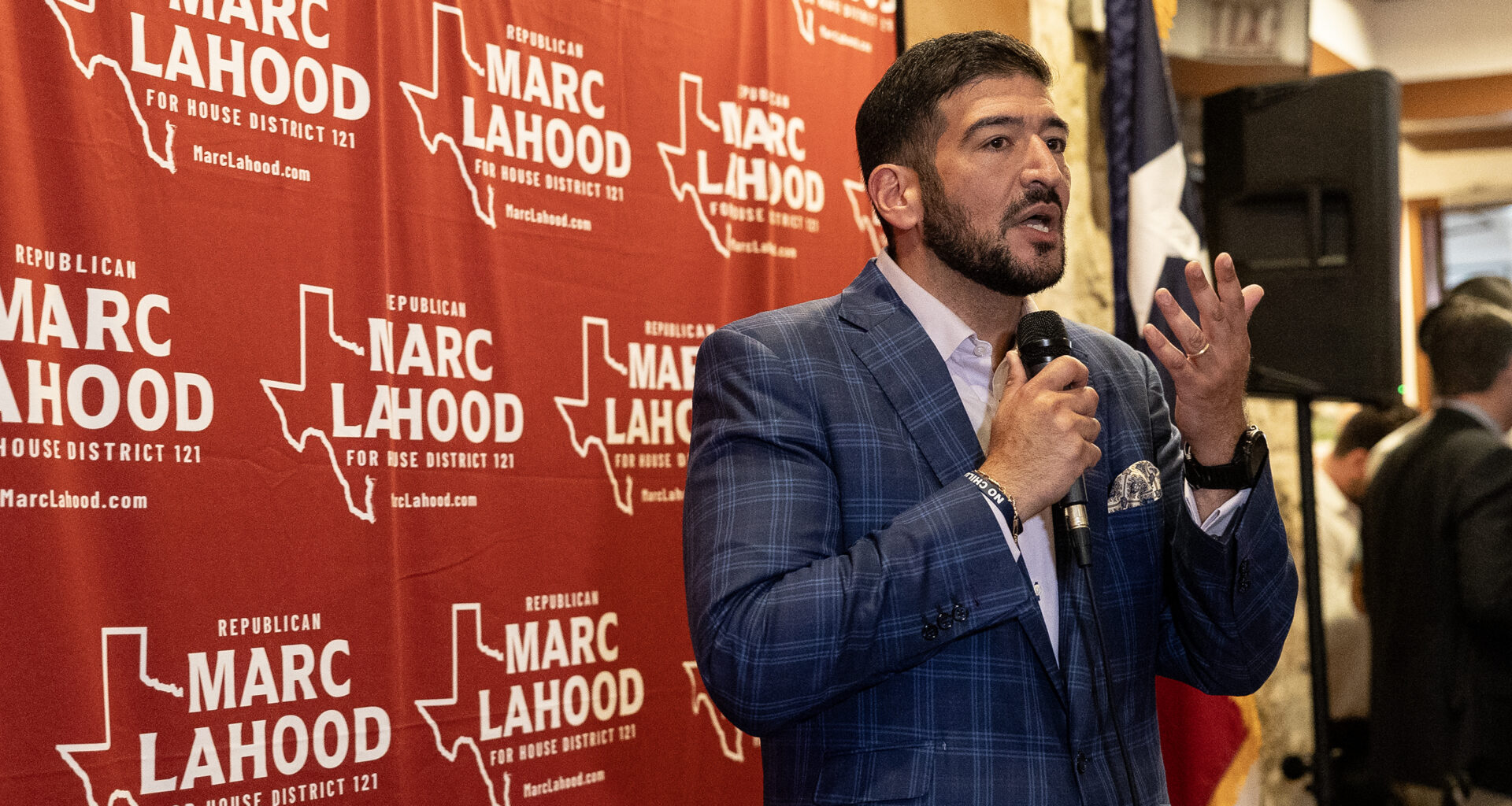Few expected state Rep. Marc LaHood’s (R-San Antonio) first legislative session to come to such a dramatic close.
With just days left in the state’s 140-day policy-making sprint, the freshman lawmaker dealt an unexpected blow to one of the state’s most powerful lobbying entities — walking out of a committee meeting in a move the group’s leaders say killed a pair of legal reform bills supported by everyone from Gov. Greg Abbott to an Elon Musk-backed business group.
It’s the type of action that could easily be career-ending in the cutthroat Texas Legislature, where lobbyists’ dollars are critical and GOP primaries present a constant threat to those who step out of line.
“Most people, all they see is the campaign attack ads …. so I think it’s probably a fair thing to say that a lot of people were surprised,” LaHood said in a recent interview with the Report.
But as the chamber’s conservative wing takes emboldened steps to dismantle any remaining power of the GOP establishment, LaHood, whose 121st Texas House District has long preferred more business-centric Republicans, is emerging as an unlikely champion of that cause.
The 46-year-old won a Northside state House seat last year with the help of an unusual coalition of GOP backers, united by their desire to root out popular incumbent state Rep. Steve Allison (R-Alamo Heights) so they could create a school voucher program.
While LaHood indeed went on to help push that long-failed conservative dream into law, he also aligned himself with a wing of the GOP that has much bigger goals of reshaping the Texas House.
This year LaHood was one of 52 House Republicans who backed an unsuccessful conservative House speaker candidate, suggesting at the time that the chamber’s existing leaders had been an obstacle to Republican policy goals in a state where their party controls every lever of power.
“Power was brokered between people, and the cost of that was some of the Republican priorities, whether it’s border security or school choice,” LaHood told the Report months out from the speaker’s race.
Though that effort failed, the criminal defense attorney has since become the face of a different conservative priority: Dethroning the pro-business group Texans for Lawsuit Reform (TLR), which is among the single biggest spenders in state legislative races and backed a number of establishment Republicans who lost last year, including Allison.
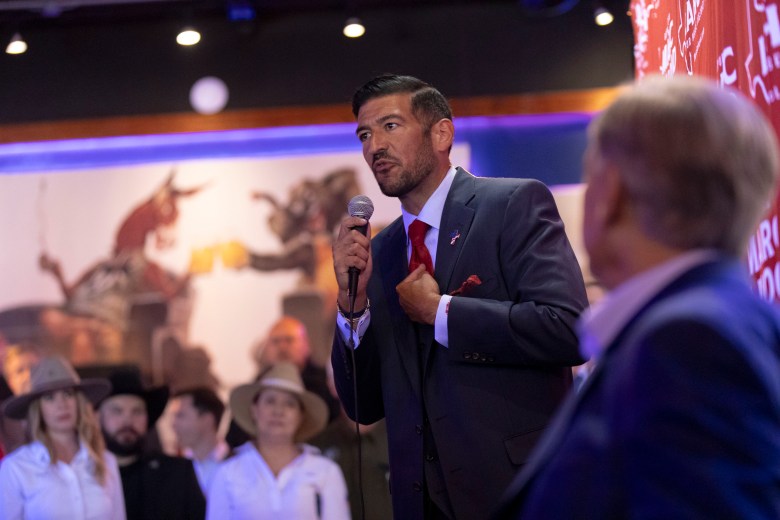 Marc LaHood, a candidate for Texas House of Representatives (R-121) appeals to voters along with Governor Greg Abbott at the Angry Elephant. Credit: Scott Ball / San Antonio Report
Marc LaHood, a candidate for Texas House of Representatives (R-121) appeals to voters along with Governor Greg Abbott at the Angry Elephant. Credit: Scott Ball / San Antonio Report
LaHood told the San Antonio Report he never imagined the legal reform bills would become such a defining issue.
“I wasn’t really thinking about anything other than the bill, what I believe the bill did, what I believe it didn’t do, and how I believe it would affect Texans,” LaHood said.
But his and other conservatives’ work derailing them has been the talk of the state’s political insiders since TLR’s leaders wrote to major GOP donors detailing the dispute after the session ended — setting the stage for another round of potentially bruising primaries between the party’s business-minded and conservative wings in 2026.
“We feared from the outset that Mr. LaHood was not philosophically aligned with the business community, and we were right,” TLR’s general counsel Lee Parsley wrote. ” … we must redouble our efforts to elect strong, ethical, legislators.”
Meanwhile, conservatives who’ve nearly run out of red districts to flip in primaries are already using LaHood’s reelection race a testing ground for messaging their ideas with a broader swath of voters.
LaHood responded to TLR’s leaders with his own scathing letter framing his actions as a rebuke of powerful business interests that are used to unchecked influence.
“I will not serve TLR’s special interests that are still reaping record profits while
financing this lobby effort to strip people of their constitutional rights,” he wrote. “Nor will I be bullied into submission.”
Days later, he launched a reelection campaign with a stunning $1.25 million raised in the eight days after the state’s fundraising moratorium was lifted.
Individual contributors won’t be made public until the campaign finance deadline on July 15, but LaHood said the number was early evidence the party’s old power structure is on the decline.
“Our historic fundraising reflects the reality that you can vote as a principled conservative Republican and still be an unapologetic voice for working-class families,” he wrote.
‘I do not run from a fight’
The LaHood name is well-known beyond politics in San Antonio, where Marc LaHood’s name and image appear frequently on billboards advertising his family’s law firm.
His brother Nico was the onetime Bexar County District Attorney who lost the position in a Democratic primary in 2018. When Marc LaHood ran to reclaim his brother’s seat in 2022, he did so as a conservative Republican, raising big money and attention, but losing by double digits.
Two years later, when Abbott signaled plans to primary Republicans who voted against his school voucher plan, LaHood joined the House District 121 race before the bill had even made it to the House floor.
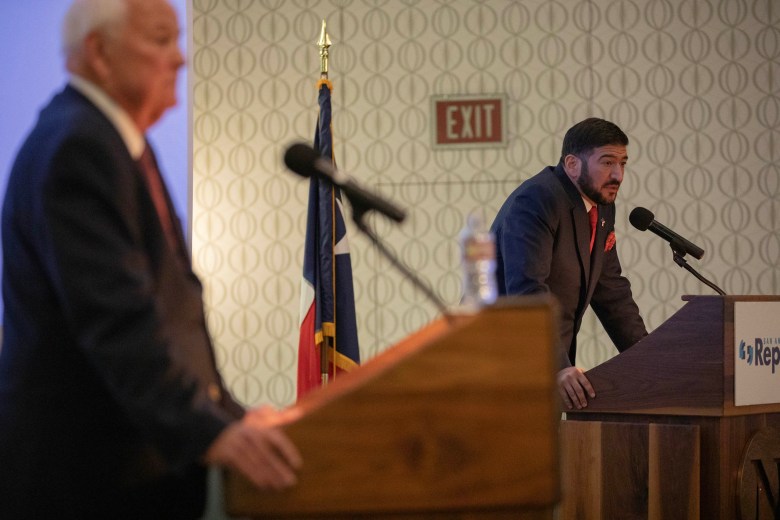 Marc Lahood, a Republican challenger for Texas House District 121 debates with incumbent Steve Allison during a San Antonio Report event before the 2024 GOP primary. Credit: Scott Ball / San Antonio Report
Marc Lahood, a Republican challenger for Texas House District 121 debates with incumbent Steve Allison during a San Antonio Report event before the 2024 GOP primary. Credit: Scott Ball / San Antonio Report
Many local Republicans were shocked to see him handily defeat Allison, a former Alamo Heights ISD Board president who had previously been a close ally of the governor.
But perhaps less noticeable in that primary was the intra-party tension simmering over the House’s vote to impeach Attorney General Ken Paxton that summer — divisions that would continue to divide Republicans the following session after members of the Texas Senate voted to acquit him.
When Paxton asked the House Appropriations Committee to cover his legal expenses in a case brought against him by staffers, Allison emerged as a critic of the attorney general. Well-heeled conservative groups that supported Paxton later rallied around LaHood to defeat Allison, including West Texas oil billionaires Tim Dunn and Farris Wilks, who’ve been instrumental in the rightward shift of the Texas legislature.
Now LaHood is considered a rising star in the conservative movement, taking on fights its leaders want to see happen at potentially big personal expense.
Compared to the deep-red districts held by other conservatives, his Texas House District 121 includes wealthy, college-educated suburbs that have been trending away from Republicans at the federal level, but still often embrace more centrist Republicans in state and local races.
After a host of brutal GOP primaries across the state LaHood was one of the few winners to face an expensive general election as well — making his approach at the legislature somewhat surprising.
By the legal reform group’s telling, LaHood was a freshman poised to cast critical votes on whether a trio of bills the business community wanted could advance to the House floor from the House Committee on Judiciary and Civil Jurisprudence he served on.
LaHood was talked into supporting SB 30, aimed at reining in how much lawsuits cover for medical bills, which ultimately failed due to maneuvering by other conservatives, the group’s leaders said.
But on two other bills, SB 39, related to trucking lawsuits, and SB 779, related to public nuisance lawsuits, TLR said LaHood was the deciding vote and walked out of a meeting to kill them without taking public positions that could upset business interests.
“He quickly left the committee room, knowing that the committee chairman intended to call for votes on our other two bills,” the group wrote in the now widely circulated donor letter. “This would have forced Mr. LaHood to put his opposition on the record. Instead of doing that, Mr. LaHood fled.”
LaHood contests that assessment, saying he’d previously raised concern with the group’s leaders about elements of the bills that were never addressed.
“The way I interpret the bills, [they would have] had monumental effects on everyday Texans,” LaHood said in an interview. “It affected patient-provider privilege, relationships and privacy, rules of evidence. It was a lot bigger than what they were saying.”
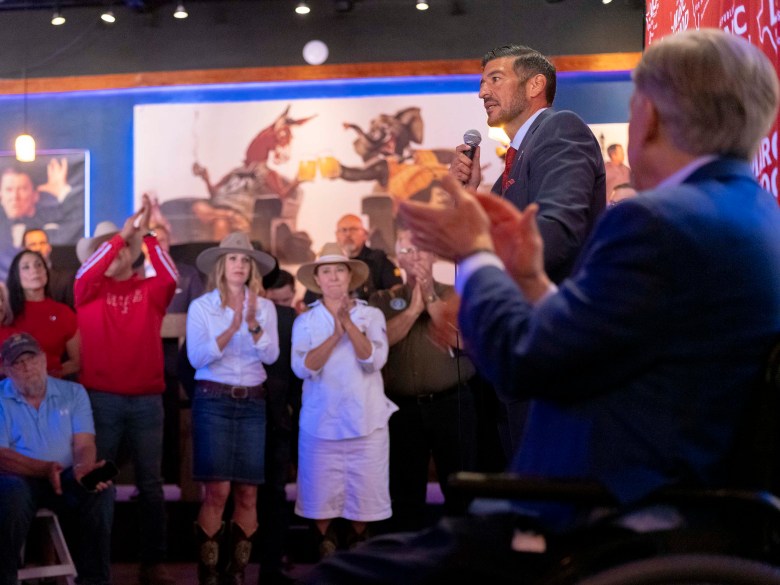 Marc LaHood, then a candidate for Texas House of Representatives (R-121) appeals to voters along with Governor Greg Abbott at the Angry Elephant on Wednesday. Credit: Scott Ball / San Antonio Report
Marc LaHood, then a candidate for Texas House of Representatives (R-121) appeals to voters along with Governor Greg Abbott at the Angry Elephant on Wednesday. Credit: Scott Ball / San Antonio Report
LaHood is hardly alone in believing Texas’ decades-long legal reform effort is approaching its natural limits.
Two years ago it even got lawmakers to create a new business court to hear cases involving high-dollar commercial disputes, which was expanded this year to include lower-dollar cases as well.
But after the TLR letter came out, LaHood leveled some unprecedented public criticism at one of the biggest spenders for GOP causes.
“Simply stated, TLR lies … I do not run from a fight,” LaHood wrote a stunning 1,170-word response that circulated quickly on social media. “As I dug into the contents [of the bills], I was appalled at the breadth of what TLR was trying to codify into law under the guise of ‘addressing bad actors.’”
A redefined right
Among local Republicans, the dispute has sparked some renewed conversation about whether business-centric candidates will continue to have the same stake in the GOP’s future as they have in the past.
San Antonio was once a beacon of the party’s moderate wing, sending former Texas Speaker Joe Straus to the legislature, among many others centrists.
Now nearly every elected Republican here faces a primary challenge, and the party has struggled to put up a fight against its many elected Democrats.
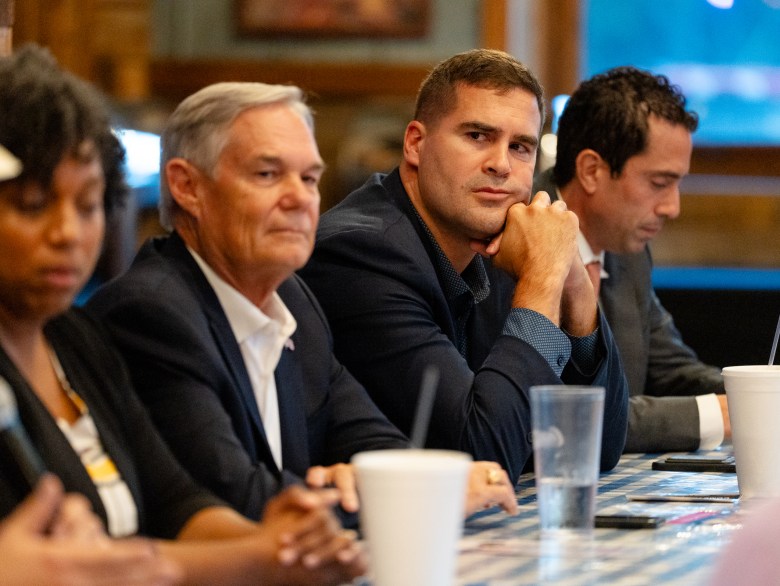 Local Republicans Lina Prado, Clayton Perry, Bexar County Commissioner Grant Moody (Pct. 3) and Councilman Marc Whyte (D10) are shown at a San Antonio Young Republicans panel at Blanco BBQ. Credit: Brenda Bazán / San Antonio Report
Local Republicans Lina Prado, Clayton Perry, Bexar County Commissioner Grant Moody (Pct. 3) and Councilman Marc Whyte (D10) are shown at a San Antonio Young Republicans panel at Blanco BBQ. Credit: Brenda Bazán / San Antonio Report
So far no high-profile candidates have raised their hands to take on LaHood — who remains in good standing with Abbott and picked up an endorsement by President Donald Trump on Friday.
“His conservative bona fides are well-defined,” said Elliott Griffin, an Austin-based political consultant who works for LaHood and other House conservatives. “There’s not a credible challenge from Marc’s right at all.”
But after Allison’s race charted new territory on how issues are framed to voters, some Republicans see room to try.
Texas GOP leaders were upset with Allison’s opposition to school vouchers, but few ads mentioned that issue. Instead, opponents attacked the incumbent on issues like border security that are nearer and dearer to the GOP base, yet didn’t really reflect his voting record.
A similar argument seems to be shaping up against LaHood.
“He is from the left. People didn’t know,” said Austin-based Republican consultant Craig Murphy, who worked for Allison and believes a challenger will emerge. “Whoever runs against him is going to be running from the right.”
TLR’s leaders echoed that sentiment, pointing to their own support for LaHood in the general election race against Democrat Laurel Jordan Swift.
“We were not sure what to expect with Representative LaHood, and [we’re] not really certain what he was thinking,” Parsley said.
“He was a freshman representative on a committee where, it turns out he’s really a swing vote. …The most surprising thing to me, is that someone in that position would not have a default position that would favor their own political party.”
From LaHood’s perspective, his approach is more open-minded than rubber-stamp.
“If you ask around, Democrats, Republican, leaders, clerks,” LaHood said, “the one thing they would say is, ‘Marc is not only open to sit down have a conversation, but I’m open to persuasion.’”
